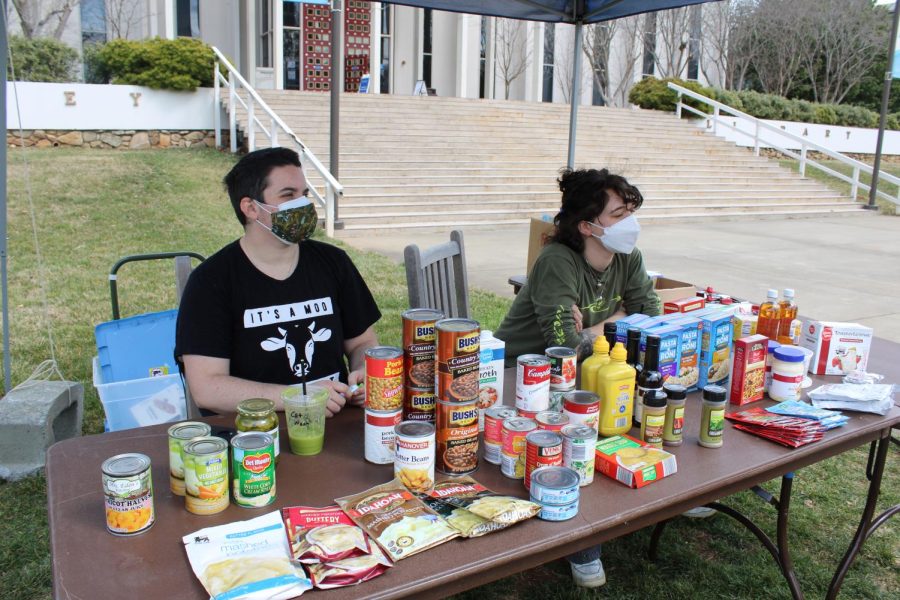Food insecurity remains a large threat to college students
Roots Marshall and Naomi Todd attempt to distribute food for students outside of the Ramsey library on a Tuesday afternoon.
February 24, 2022
The Food Equity Initiative at UNC Asheville attempts to combat food insecurity on campus, but struggles with low visibility.
“We want everybody to have enough food. We want them to have food that they like and we want them to have food that meets their nutritional and cultural needs,” said FEI Advisor Jordan Perry.
According to Perry, the program began in 2017, when the Walnut Cove Members association provided a grant with the goal of providing students access to food resources.
FEI distributes non-perishable foods on a weekly basis every Tuesday from noon to 2 p.m. on the quad.
“It’s all free. People are encouraged to take whatever they want or whatever they need,” said Naomi Todd, a student employee for FEI. “Just snacky things are really popular with people. I think people do rely on us for staple things like peanut butter and pasta.”
As FEI attempts to reach out to students directly through face-to-face interaction, Perry said a leading cause of food insecurity among college students stems from capitalism and the unequal distribution of food to those in need of it.
“The resources are hoarded by the wealthy and don’t, despite what Ronald Reagan proposed, trickle down to people without resources. There’s plenty of food. It’s just not distributed equitably,” Perry said.
Sustainability Coordinator for the City of Asheville Kiera Bulan said a variety of overlapping and interrelated issues are the likely cause for food inequity.
“Sometimes it’s an issue of access, transportation issues or being reliant on public transportation that can be challenging in terms of having access to fresh food. Sometimes it’s an economic situation, people not necessarily having the means to purchase fresh, healthy food,” she said.
One challenge the initiative faces is tackling the misconception that food insecurity does not happen to college students.
“There’s one end of the spectrum where people say, ‘OK, food insecurity doesn’t happen to college students’ and then there’s another end of the spectrum that says, ‘Oh, it doesn’t happen here,’” Perry said. “Not everybody has a meal plan and not everybody finds that the meal plan meets their needs.”
Bulan said college students, like other demographics who struggle financially, face the risk of food insecurity.
“As we know, college can be a real expense and a real financial burden on families and individuals. I think there are students in our communities that have to make those difficult choices and rely on some of the other community safety nets,” Bulan said.
Because of these struggles, Perry said student performance in college can be negatively impacted by those who experience food insecurity firsthand.
“If you’re distracted by hunger or worrying about where your next meal is coming from, it’s really hard to be present, it’s hard to focus, it’s hard to fully engage in what you’re doing. If you’re having to work a lot outside of school, it’s hard to give your full attention to school,” Perry said.
Due to low engagement with students, Todd said the FEI works with the key center to help interact with students the group struggles to reach.
“Every week we probably have between 15 to 30 people come by and I just feel like not that many people know about it, or people just don’t come and they don’t know that everything is free. People will approach the table and are not sure if they can take stuff,” Todd said.
While the FEI assists students on campus, Perry said political action is required to combat food insecurity with an understanding of the institutions around the issues.
“It’s an illusion to think that you can do this work without being political. Every choice that we make has political ramifications and when we work in the context of an institution that’s bound by politics,” Perry said.
In order to help prevent food inequity on campus, Perry said the minimum wage for student workers should increase.
“The federal minimum wage hasn’t gone up since 2009. North Carolina uses that same minimum wage as $7.25 an hour. That’s not even a living wage, much less a wage you can thrive,” they said. “Having a standard for the school, I think sets an example and shows that we value students.”
Along with raising the minimum wage, Perry also said limiting food waste helps combat food inequity. By preventing food from being discarded and wasted, it can be redistributed to those in need of it.
“Particularly when we need to work on focusing our energy to saving this planet,” Perry said. “A lot of food gets thrown away that could be redistributed.”
Students interested in combating food insecurity at UNCA can follow FEI through Instagram and Facebook.
For students who choose to combat food insecurity in Asheville, Bulan said volunteering with local organizations can serve as a learning platform for them.
“There’s a lot to learn from that experience and being grounded in the reality of people’s lived experience and there’s a lot of organizations out there doing the work on the front lines. So I strongly encourage folks to get involved in that way,” Bulan said.


![Brooke Pedersen [second from the right] and Luis Reyes [right] hold banners during the Wrap The Woods event.](https://thebluebanner.net/wp-content/uploads/2025/09/ELIZABETH_PRITCHITT_IMG_3470-1200x804.jpg)
















